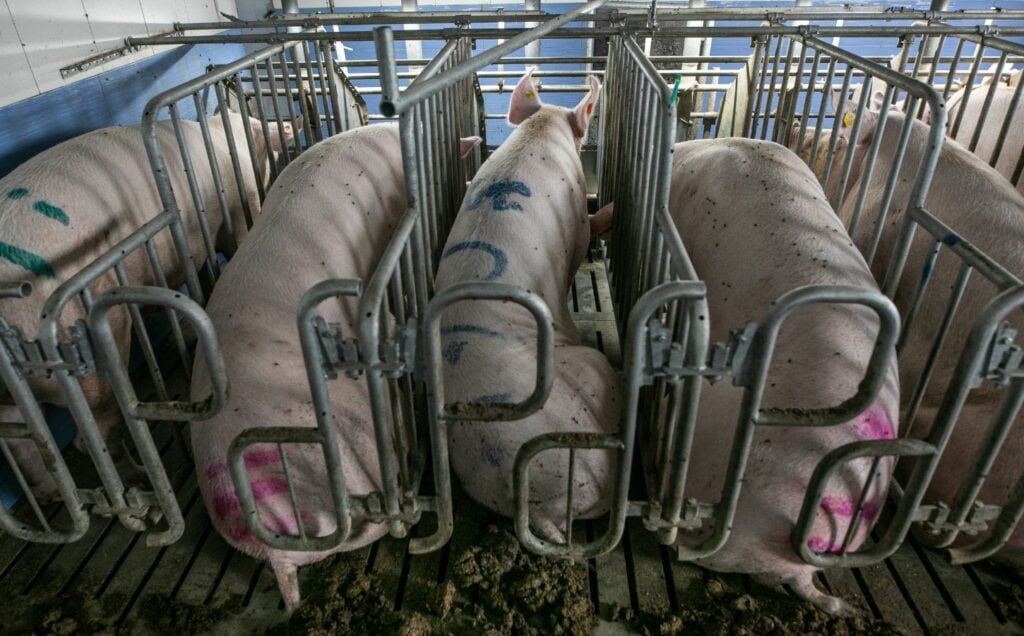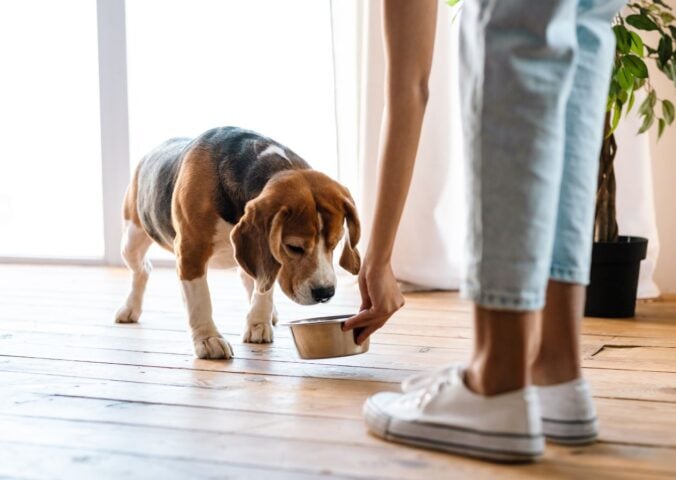Farmed pigs in Victoria, Australia are still being kept in gestation crates despite promises to ban them. That’s according to the Animal Justice Party Australia, an animal rights-focused political party.
These crates – also known as sow stalls – are traditionally used in factory farms to house female pigs for part of their gestation period. The industry claims that pigs are kept in crates because sows can become “aggressive” towards each other during pregnancy.
According to national animal welfare regulations, pigs should be kept in them for no longer than six weeks during each pregnancy. The crates measure around 0.6 meters by 2 meters and don’t offer the animals space to turn around.
Research suggests that, as well as extreme stress and frustration, these crates may cause pigs to suffer from physical ailments like weaker bones and muscles, as well as digestive and cardiovascular issues.
Many animal rights activists dispute the industry’s justification for these crates and argue that the stalls allow farms to maximize profit by keeping as many pigs as possible.
After public outrage over the crates, Australian Pork Limited (APL), a producer-owned industry body, said in 2010 that it would “commit to pursuing the voluntary phasing out of the use of sow stalls by 2017.”
But the Animal Justice Party, Australia’s only party dedicated to protecting all animals, claims it recently saw undercover footage from six piggeries in Victoria proving that the stalls are still being used. The party is now calling for an outright ban in the area.
The fight to end gestation crates
APL states on its website that it has taken a “world-leading position by voluntarily committing to phasing out sow stalls.” It currently recommends that sows be kept in larger pens for most of their gestation period, except for five days after mating and one week before they are due to give birth (when they are moved to a farrowing crate).
But many farms are under no legal obligation to follow this recommendation. Currently, the only jurisdictions in Australia to have a law against gestation crates are the Australian Capital Territory and Tasmania.
Animal Justice Party’s Andy Meddick, who brought the issue of banning crates to parliament, told Plant Based News (PBN) that the industry “cannot be trusted” to regulate itself.
“They must be forced,” he added. “Those found non-compliant after the fixed date should be heavily fined and closed for good.”
A hidden industry
Gestation crates are highly controversial among the meat-eating public, and 82 percent of Australians agree that they should be banned.
The reason they are being allowed to continue may be partly due to the fact that they are kept so secret from the public.
“These farms are well hidden from view,” Meddick told PBN. “Because they are sheds, if someone was to drive by they would simply see a series of large farm sheds and accompanying structures. They simply would not be aware of what was going on there.”
According to Meddick, many supermarkets advertise that they sell “stall free” because that’s what they are being told by their suppliers. He says that it is unclear whether they are aware or not. The public believe it and think they are making an ethical choice,” he said. “They are being lied to.”
Is pig welfare improving elsewhere?
Gestation crates have been banned in the UK since 1999, and they are also banned in New Zealand, Switzerland, Sweden, and Finland.
Some states in the US have also taken steps to ban them, and they are currently banned in places like Rhode Island and Colorado.
However, there is still much progress to be made when it comes to pig welfare. Farrowing crates are cages that pigs are kept in for around five weeks after giving birth. These are still permitted in many countries, including the UK.
These crates also offer the pig no room to turn around, and piglets suckle from a small area known as “the creep.” Female pigs are not able to access their young from the cage.
Mimi Bekhechi, Vice President PETA UK, Europe and Australia, told PBN: “At the very least, governments around the world should take steps to reduce animal suffering by banning intensive confinement systems, including gestation crates, and by providing farmers with financial support to move away from cruel and environmentally destructive animal agriculture and towards growing crops.”
PBN reached out to APL about their gestation crate policy. A spokesperson said: “The Australian pig industry remains committed to continuous improvements in pig welfare, investing in ongoing research and innovation to ensure the health and safety of our pigs and our people. This included the voluntarily phase-out of sow stalls in line with community sentiment.”






